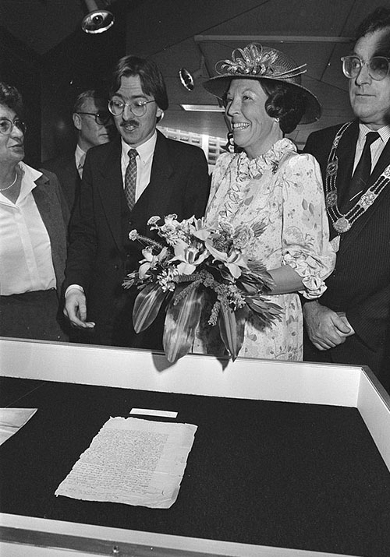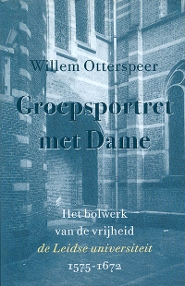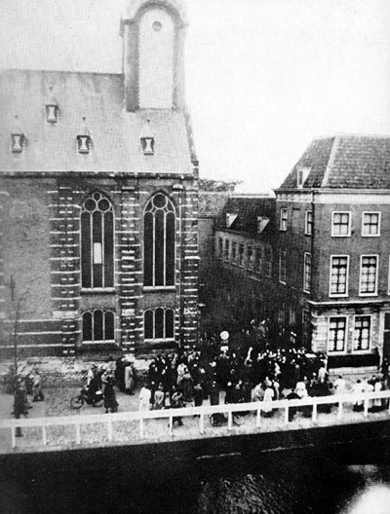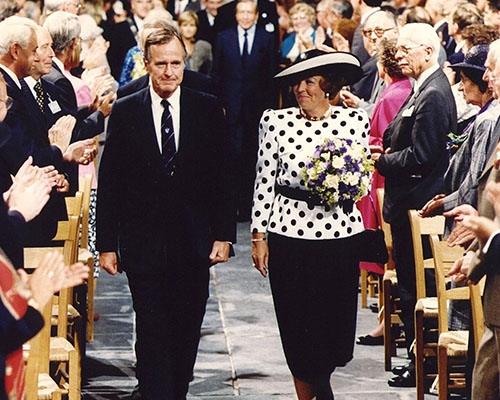
Professor Willem Otterspeer on his retirement: ‘My career is like the Danube.’
University historian Willem Otterspeer is about to retire, and he will give his farewell lecture on 4 November. Although... it is really a farewell? He still plans to write another five books, using oceans of archive material. 'An archive should be like the surf breaking on the seashore: wonderful to immerse yourself in it.'
Your farewell lecture is entitled ‘The sense of an ending’. How do you feel about retiring?
‘As you might expect, a bit nostalgic. There are on the whole two ways of departing, whether it's life or your career. Either you resist or you make peace with it, and then look back with a degree of contentment. I think I fall into the second category. It may not be proper for a critical historian to say, but the university is one of the most magnificant institutes in western culture. It's chock full of enthusiastic individuals. Openness and a fair discussion are things you can be sure of.
‘At the end of the ’70s I had the option of two jobs: a journalist for the Cultural Supplement of NRC Handelsblad or curator at the Academic Historical Museum of Leiden University. I chose instinctively for the University, although I have written freelance for the NRC for many years. But I have to say, I still believe the University is a better environment than newspaper publishing, where market forces play a much bigger role. It's true, universities today are much more exposed to external control and accountability, but even so we still have more freedom to do our own research.'

What is your farewell lecture about?
‘I began my professorship with a lecture about the start of my research. At that time it was common to reveal your whole plan in your lecture and then at the end of the research to see how much you'd actually achieved. That's not done any more and my farewell lecture will be more about other people than about me. I'm taking 'the incomplete' as my theme and I'm going to talk about how endings are portrayed in poems or works of art. And about the question of whether artists exhibit a different style towards the end of their life.'
Has your style changed?
‘I'd need to check that, but I don't think it's changed very much. For someone like Huizinga (a historian about whom Otterspeer wrote a biography, Ed.) it was very obvious. In Herfstij der Middeleeuwen his style was ornate, almost decadent, yet towards the end of his life, his language use became sober and unadorned. I don't think there's such a noticeable difference in my work. I'm more of a 'stayer', to use a cycling term. That's someone who sets the pace, and keeps up the same speed over a long period. I can no longer rely on the sudden spurts of energy that I used to have. When I was doing my PhD, I wrote my dissertation at night and was only just going home as the morning papers were being delivered.'
You've received many awards, but there's also been some strong criticism, such as that of your biography of Willem Frederik Hermans. Do you take it personally?
‘Hermans is a special case. You get the impression that a lot of readers and critics are like dogs, wanting to be like their masters. They behave the same, but without the talent that goes with it. Ah well, but it was wonderful to write a book about him. It started to go wrong right from the title Mislukkingskunstenaar. Some readers thought I meant 'failed artist', but what I was actually referring to was that failure is an important theme in his work.’
What would a biographer say about you? What's your theme?
‘No biographer could ever write about me. I love archives, but, as far as my own things are concerned, I throw almost everything away. I value my privacy. Not only that, I've had a very boring life with no major hiccups. But OK, if I had to choose one pervasive theme, it would be how you find the path back to literature in a university like this. I kept looking for the right combination and made sure that I could be part of both worlds. My books about the University are steeped in literature.'

With hindsight, are there things you would like to have done differently?
‘I'm the son of a skipper and I could have become a skipper myself. That would have pleased my father. You make decisions, many of which are completely in the dark. It's like the books about the University. Afterwards you might wonder whether you really should have written four such tomes about the University's history. But the 440-year history of Leiden University splits organically into four periods. The first three were published quite some time ago (under the title Groepsportret met Dame, Ed.) and I'm really looking forward to working on the fourth part. What's good is that there's so much more archive material than for the first three parts. An archive should be like the surf breaking on the seashore, inviting you to jump in.'
When will the fourth volume be published?
‘In two years' time. But first I'm going to write about Leiden University in the Second World War. A big part of volume four is about the period from 1876 to 1975. Histories have already been written about other universities, such as Groningen and Amsterdam, in World War II, but not about Leiden. I'll be looking at the attitude of different universities - technical, protestant, old and young - during the war years. I want to find out to what extent their character explains why they reacted so differently to the war.

Anything that particularly stands out?
‘I'll keep a more detailed answer to myself for now, but Leiden University responded relatively well. The Germans tried to 'nazify' the university but the professors put a end to that by stopping work en mass. Many of their students went to study in Amsterdam or Utrecht. There were also collaborators in Leiden and after the war there were purges, though fortunately not too many people lost their lives; five or so. The book has to be even-handed and also has to pay proper attention to the victims.'
You are now going to retire, but that doesn't mean you'll be working any less.
‘My career is like the Danube. You're not sure where it starts or where it ends. As well as the book about the Second World War and the fourth volume, there are a further three books I want to finish. One is about four academic prints dating from 1610. Then there's a dual biography about Huizinga and his bosom friend André Jolles. And then I want to write a book about the history of unversities in general. I'm also giving a number of lectures. You get more energy back from the interaction with young people than you put in. Although, I found marking 150 exams less energizing.'

As University historian you have also shown a lot of people around, including several presidents. Which do you remember most?
‘The most fascinating was when President Bush senior came to Leiden in 1989. He went to the Pieterskerk to visit the graves of the Pilgrim Fathers, from whom he is descended. I had prepared an exhibition for his visit, including a cabinet of curiosities, one of which was a beautifully dissected human bladder. An official from the American Embassy said the item was in 'poor taste' and wanted it removed. I refused. But when the Royal Family also asked me to remove it, I eventually agreed. The big day itself swept past in a haze of activity. Queen Beatrix kept a strict eye on everything and thanked me for taking so much trouble. I gave Bush a rapid tour of the exhibition and he said,' Oh boy, you took a lot of trouble.’
(LvP)
